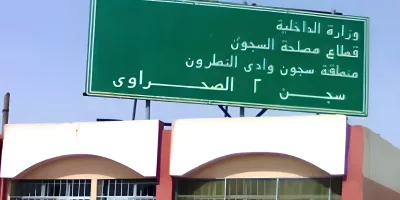Authorities in Egypt have intensified executions between April and June 2021, amid international inaction and a US desire to place political and economic interests above the values of human rights. This US policy was evident in the first period of the US President Joe Biden’s rule, but changed after the Egyptian mediation in the recent war on the Gaza Strip.
In its second quarterly report for 2021 titled “Egypt’s Execution Frenzy” and as part of its Detention Watch project, the Committee for Justice said that Egyptian authorities have retracted the steps they had taken at the beginning of the Biden administration, as 300 of the 600 detainees who had been granted a presidential pardon were re-arrested.
The organization also clarified that the name of the report reflects the large number of death sentences issued or carried out during that period. CFJ noted that these developments do not only reflect the Egyptian authorities’ pure reliance on their “strategic” partnership with the United States and the European Union, but also their exploitation of opportunities in the regional arena, and activation of the institutional frameworks the state has entrenched for years through a long list of notorious laws.
CFJ also indicated that the reporting period witnessed arrests of citizens on several occasions, with the arrest of 11 citizens, including two female journalists, for demonstrating in solidarity with Palestine during the recent Israeli attacks on the Gaza Strip, as well as the arrest of 13 citizens of Ezbet Nadi el-Seid in Alexandria, after the residents of the area demonstrated against their forced displacement.
CFJ added that during the second quarter of 2021 the successive security attacks on political opponents, workers, journalists and human rights defenders were reflected in the number of violations that it was able to document and verify.
The organization pointed out that out of the total of 1,774 violations documented, arbitrary deprivation of liberty topped the list by approximately 67 percent (1206/1774), followed by enforced disappearance, which accounted for about 26 percent (472/1774), then poor conditions of detention, torture and death in detention facilities, with 72, 14, and 10 violations, respectively.
In terms of verification, CFJ verified 342 violations, including torture (70), enforced disappearance (58), arbitrary deprivation of liberty (77), and poor conditions of detention (137).
CFJ also pointed out that June 2021 topped the list of documented violations by about 42 percent (749/1774), and Cairo governorate topped the list of the 18 governorates where violations were reported, with 70 percent of the total violations, especially enforced disappearance and arbitrary deprivation of liberty, as 429 and 759 incidents were recorded in Cairo alone, in each of the two classifications, respectively.
The report also included an analysis of the documented and verified data according to age groups and professional groups, an analysis of the litigation bodies that hear cases against victims, and the legal status of those victims.
The report also pointed out a rise in violations against lawyers, including 14 cases of arbitrary deprivation of liberty and 4 cases of enforced disappearance, which reflects a reality captured by CFJ’s field researchers, who observed repeated incidents of threatening lawyers and intimidating them with arrest and imprisonment in the event that they show rights groups documents deemed “secrets” by security and judicial authorities. Such documents include indictments issued by prosecutors, judgment documents, or litigation proceedings. That behavior explains the issuance of Law no. 71/2021 in May, which criminalizes filming, broadcasting, recording, publishing or displaying excerpts of court proceedings in criminal cases.
The report’s data also showed an increase in the number of violations against students, especially arbitrary deprivation of liberty (12 incidents), which intersected with three incidents of enforced disappearance. The figures reflect the effects of the double standards of the Egyptian regime, as its stated policy seeking reconstruction in Gaza contradicts with the crackdown on 12 students in April and May (the peak of the Gaza hostilities) in accordance with the Emergency, Terrorism and Protest laws.
In an effort to do justice to these victims and to redress the injustice inflicted on them, CFJ’s UN communication team submitted 26 complaints on behalf of more than 50 victims during the second quarter of 2021. The most prominent of which were complaints submitted to the Panel on Arbitrary Detention, the Panel on Enforced Disappearances, the Special Rapporteurs on Arbitrary Executions, Torture and Inhuman Treatment, and the Situation of Human Rights Defenders.
CFJ added that during the reporting period – and before it – these efforts resulted in the identification of the places of detention of 7 victims of enforced disappearance, the issuance of UN communications regarding 11 complaints, the release of three victims of arbitrary arrest, or the families’ request to close the complaint file.
The report’s conclusion recommended pressuring the Egyptian authorities to urgently suspend the issuance and implementation of the death penalty in Egypt and to consider the international requests that called on Egypt to abolish the execution of the death penalty, replace it with other reduced penalties, and retry the convicted defendants, while providing fair trial guarantees for them.
The report also called on Egypt to criminalize enforced disappearance and torture, investigate the incidents declared by the defendants before the investigation authorities, hold the perpetrators to account and prevent impunity, and activate Articles 55 and 54 of the Constitution, which prohibit intimidating the accused or harming them physically or morally.
The organization also called on the Egyptian authorities to stop the crackdown on citizens participating in protests related to the right to housing or work, to reconsider the amendments to the Public Business Sector Law, and to immediately release peaceful opponents and prisoners of conscience in Egyptian prisons who are being held in pretrial detention for lengthy periods. CFJ also called on Egypt to end the practice of “recycling cases”, repeal notorious laws particularly the Emergency Law.
The organization also called on Egypt to stop practices of gender-based discrimination pursued by judicial institutions, lift the state’s guardianship on women, stop prosecuting them on vague charges such as “violating the principles and values of the Egyptian family”, and to rescind judgments issued by judicial authorities based on that accusation.
Skip to PDF content





